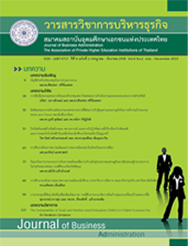การถือหุ้นของบุคคลภายในและนักลงทุนสถาบันต่อผลการดำเนินงาน และผลตอบแทนจากหลักทรัพย์
Keywords:
สัดส่วนการถือหุ้นของบุคคลภายใน, สัดส่วนการถือหุ้นของนักลงทุนสถาบัน, ผลการดำเนินงานของบริษัท, ผลตอบแทนจากหลักทรัพย์, ความแปรปรวนของผลตอบแทนจากหลักทรัพย์, Insider Ownership, Institutional Investor Ownership, Firm Performance, Stock Return, Stock Return VolaAbstract
งานวิจัยนี้ศึกษาความสัมพันธ์ระหว่างสัดส่วนการถือหุ้นของผู้บริหาร ผู้ถือหุ้นรายใหญ่และนักลงทุนสถาบันกับผลการดำเนินงานของบริษัท ผลตอบแทนจากหลักทรัพย์และความแปรปรวนของผลตอบแทนจากหลักทรัพย์ของบริษัทจดทะเบียนในตลาดหลักทรัพย์แห่งประเทศไทยที่ดำเนินงานในปีพ.ศ. 2554–2556จำนวน 378 บริษัท โดยใช้การวิเคราะห์ค่าสหสัมพันธ์การทดสอบความแตกต่างระหว่างค่าเฉลี่ยของกลุ่มตัวอย่าง 2 กลุ่มที่เป็นอิสระจากกันและการวิเคราะห์สมการถดถอยเชิงพหุคูณในการวิจัยผลการวิจัยชี้ให้เห็นว่า สัดส่วนการถือหุ้นของผู้บริหาร ผู้ถือหุ้นรายใหญ่และนักลงทุนสถาบันส่งผลทางบวกต่อผลการดำเนินงานของบริษัท สัดส่วนการถือหุ้นของผู้บริหารส่งผลทางลบต่อผลตอบแทนจากหลักทรัพย์ ในขณะที่สัดส่วนการถือหุ้นของนักลงทุนสถาบันมีความสัมพันธ์ทางบวกกับผลตอบแทนจากหลักทรัพย์ เนื่องจากนักลงทุนสถาบันจะทำการติดตามการทำงานของผู้บริหารอย่างใกล้ชิด จึงช่วยลดโอกาสที่ผู้บริหารจะตัดสินใจโดยเอาผลประโยชน์ของตนเองเป็นที่ตั้งลงได้และช่วยทำให้ผู้บริหารมีการตัดสินใจโดยคำนึงถึงการสร้างมูลค่าสูงสุดให้แก่ริษัทสัดส่วนการถือหุ้นของผู้บริหารและผูถื้อหุ้นรายใหญ่ส่งผลทางลบต่อความแปรปรวนของผลตอบแทนจากหลักทรัพย์กล่าวคือ การถือหุ้นของผู้บริหารและผูถื้อหุ้นรายใหญที่เพิ่มขึ้นจะช่วยลดความผันผวนของผลตอบแทนจากหลักทรัพย์ลงได้ และสัดส่วนการถือหุ้นของนักลงทุนสถาบันส่งผลทางบวกต่อความแปรปรวนของผลตอบแทนจากหลักทรัพย์
Insider Ownership and Institutional Investor Ownership on Firm Performance and Stock Return
This paper presents the relationship between executive ownership, blockholder ownership, institutional investor ownership and firm performance, stock return, stock return volatility by using data from 378 firms listed in the Stock Exchange of Thailand from 2011 to 2013. And using Correlation Analysis, Independent Two Samples t-Test and Multiple Regression Analysis The results show the positive effect of executive ownership, blockholder ownership and institutional investor ownership on firm performance. Executive ownership has negative effect on stock returns On the other hand, the institutional investor ownership positively affects the stock returns because institutional investor can closely monitor executive management which helps the management to maximize firm value instead of doing for their own benefits. Therefore, the higher of the institutional investor ownership the higher of the stock returns. Executive ownership and blockholder ownership negatively affect to stock return volatility. The executive and blockholder ownership will reduce the stock return volatility. Moreover, the proportion of institutional investor ownership positively affects to stock return volatility.
Downloads
How to Cite
Issue
Section
License
บทความที่ลงตีพิมพ์ในวารสารวิชาการบริหารธุรกิจ สมาคมสถาบันอุดมศึกษาเอกชนแห่งประเทศไทยต้องเป็นบทความที่ไม่เคยได้รับการตีพิมพ์เผยแพร่ หรืออยู่ระหว่างการพิจารณาตีพิมพ์ในวารสารอื่นๆ การละเมิดลิขสิทธิ์เป็นความรับผิดชอบของผู้ส่งบทความโดยตรง


